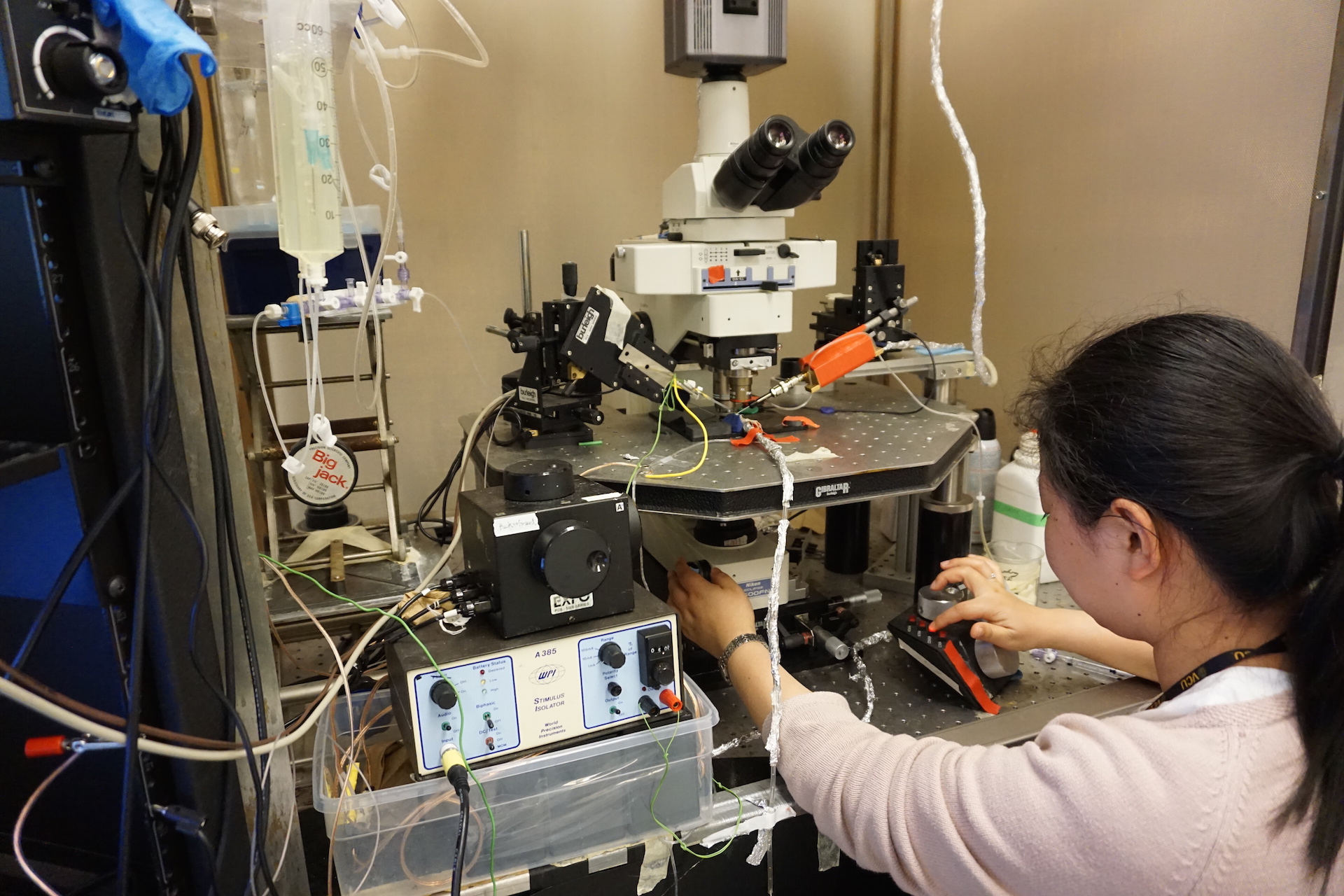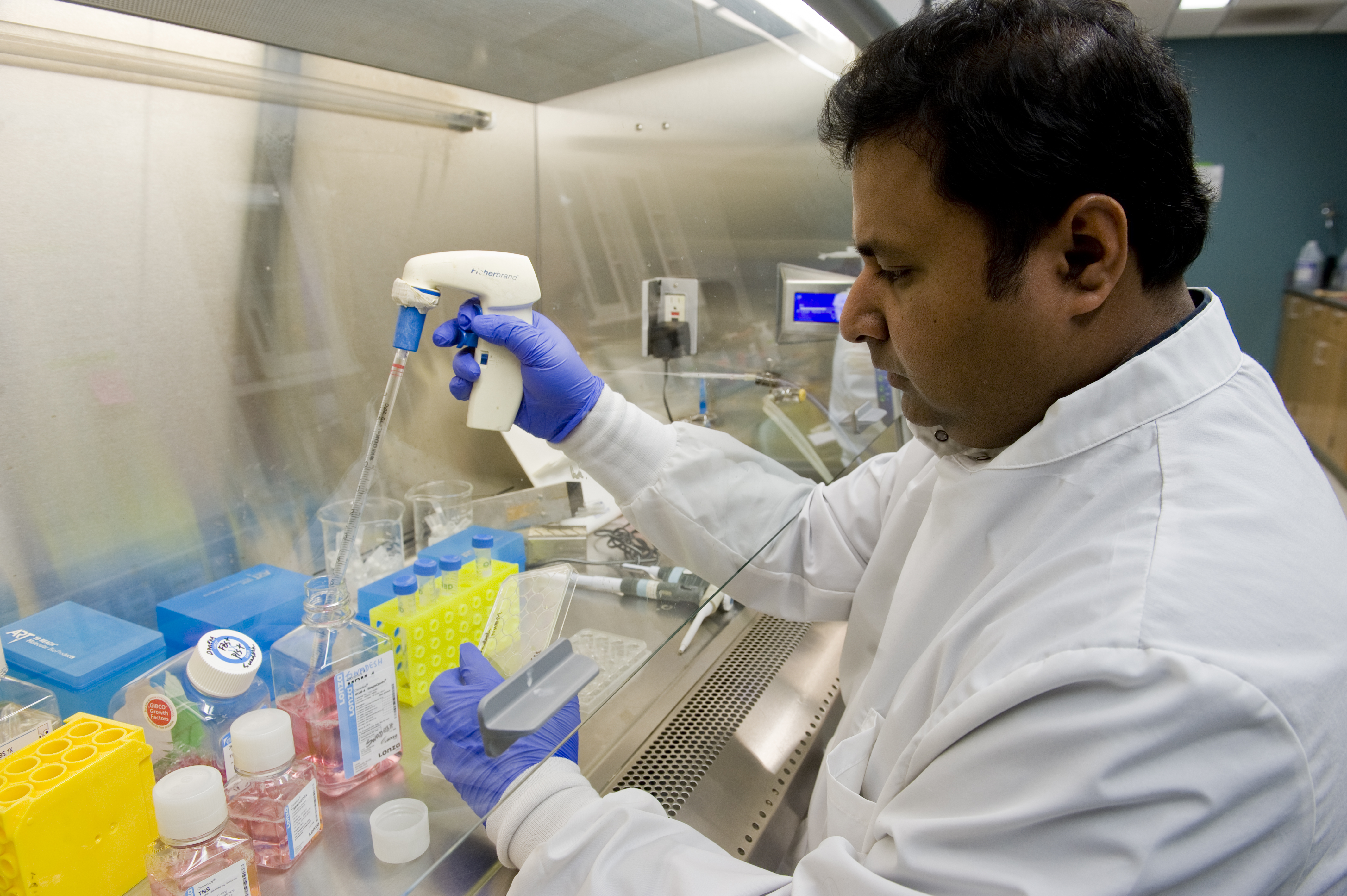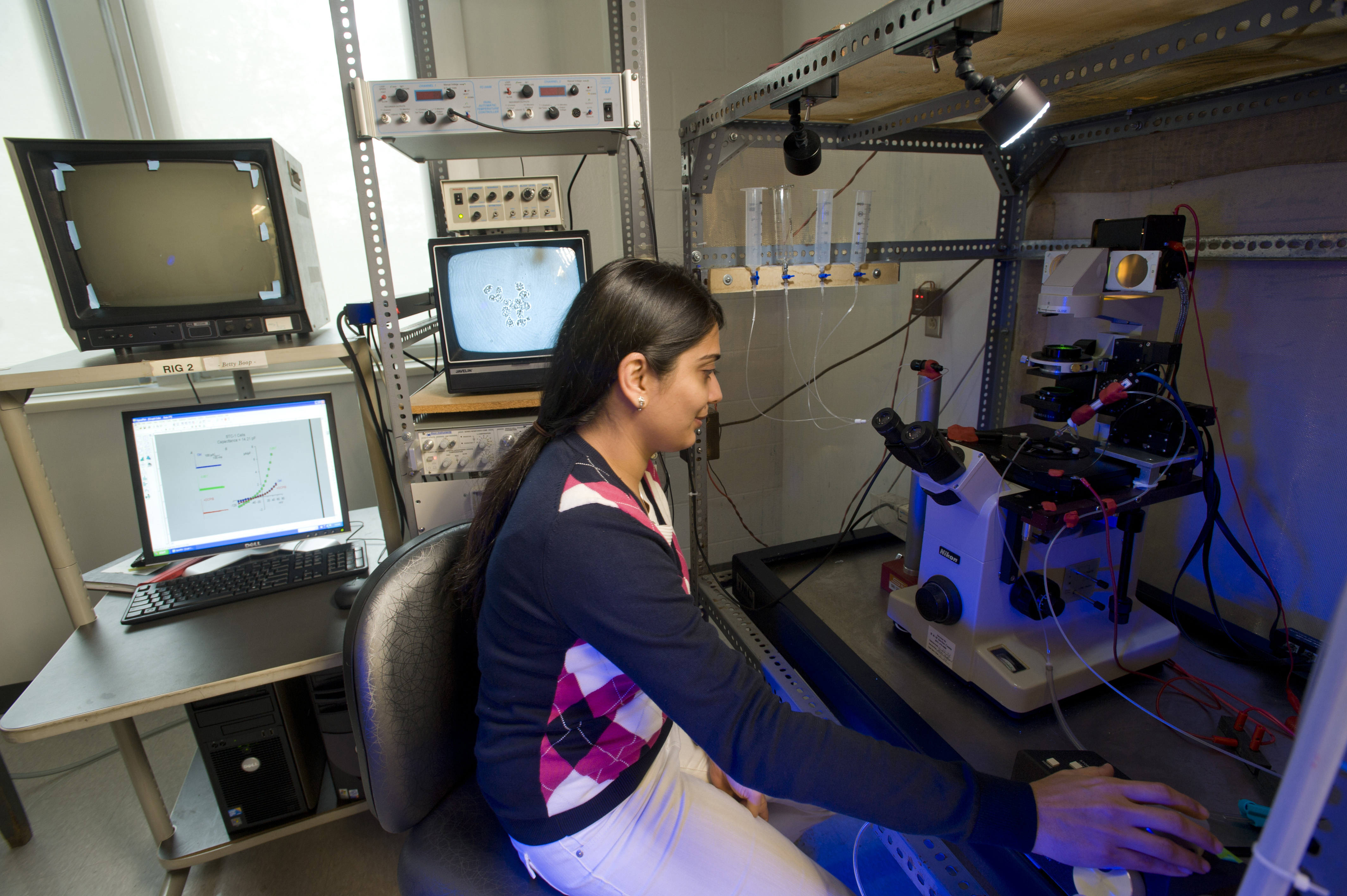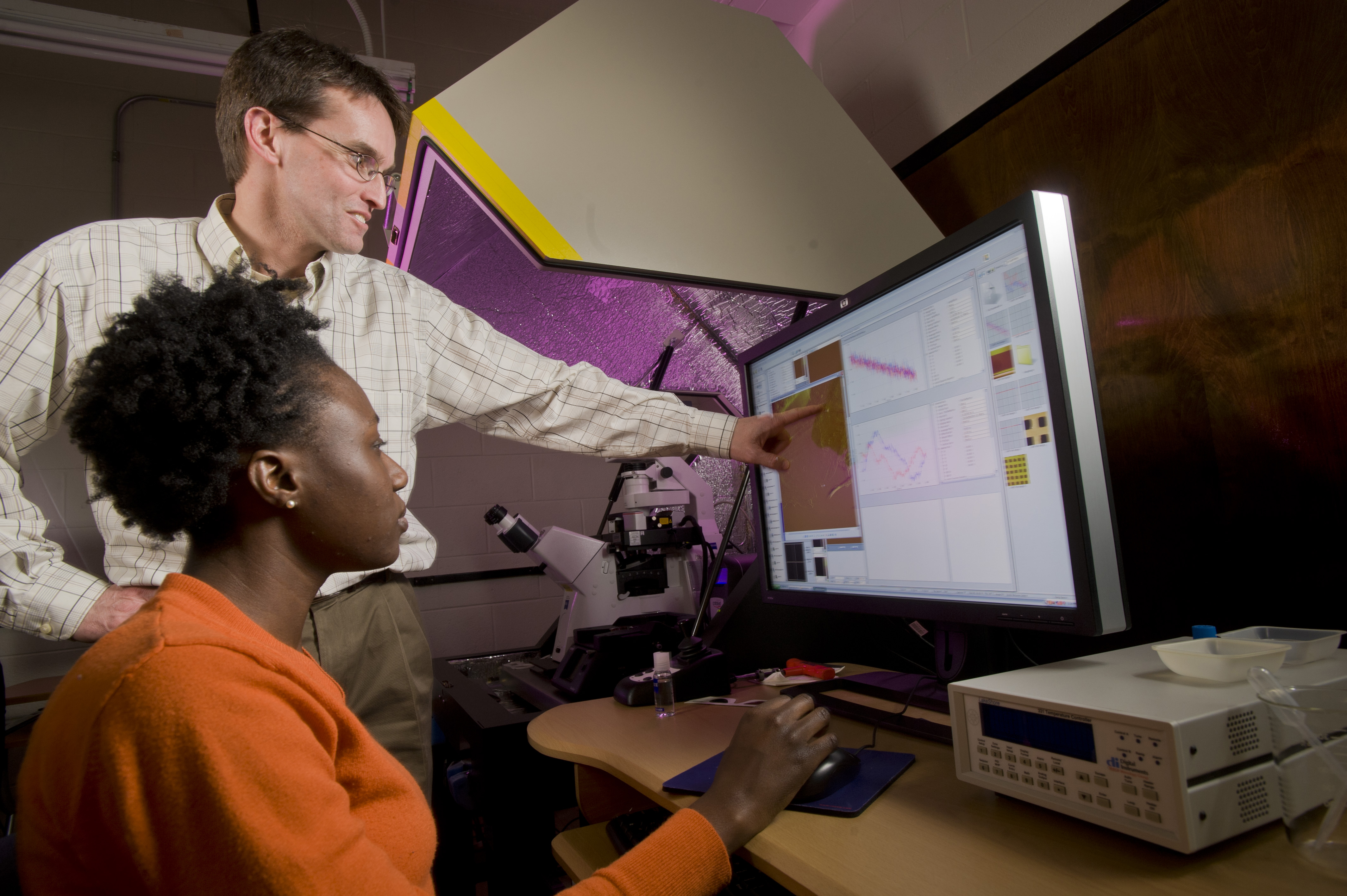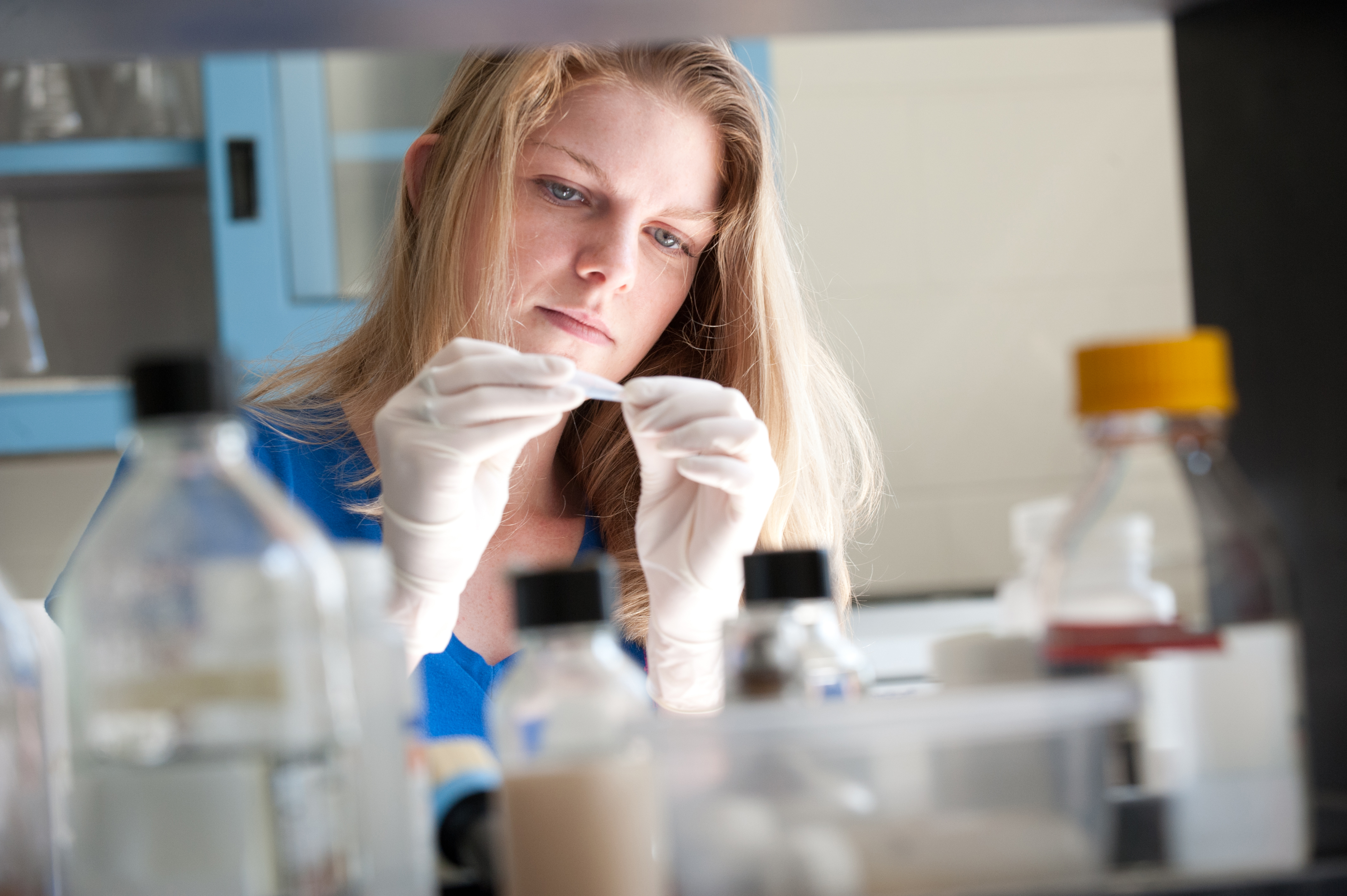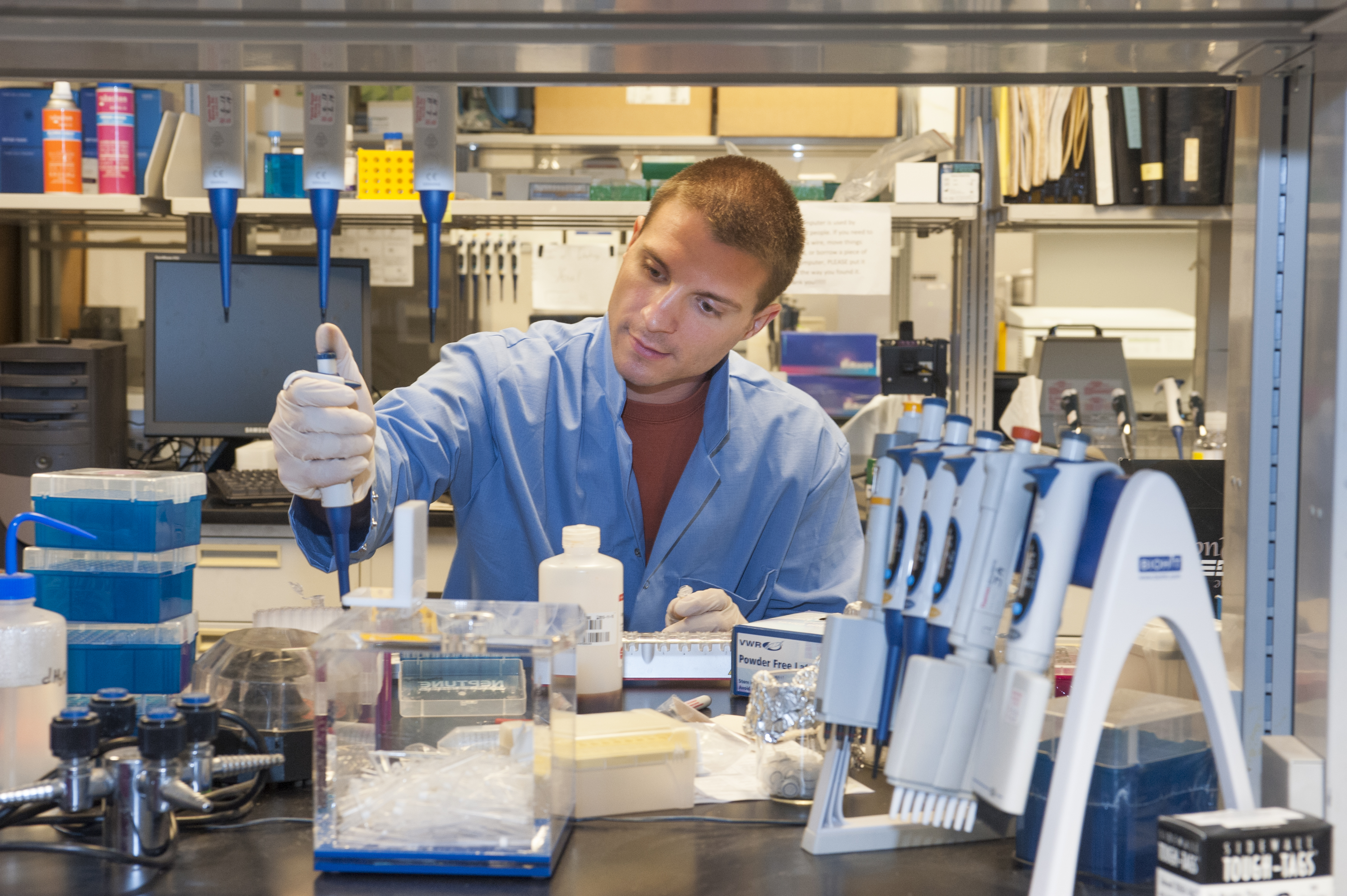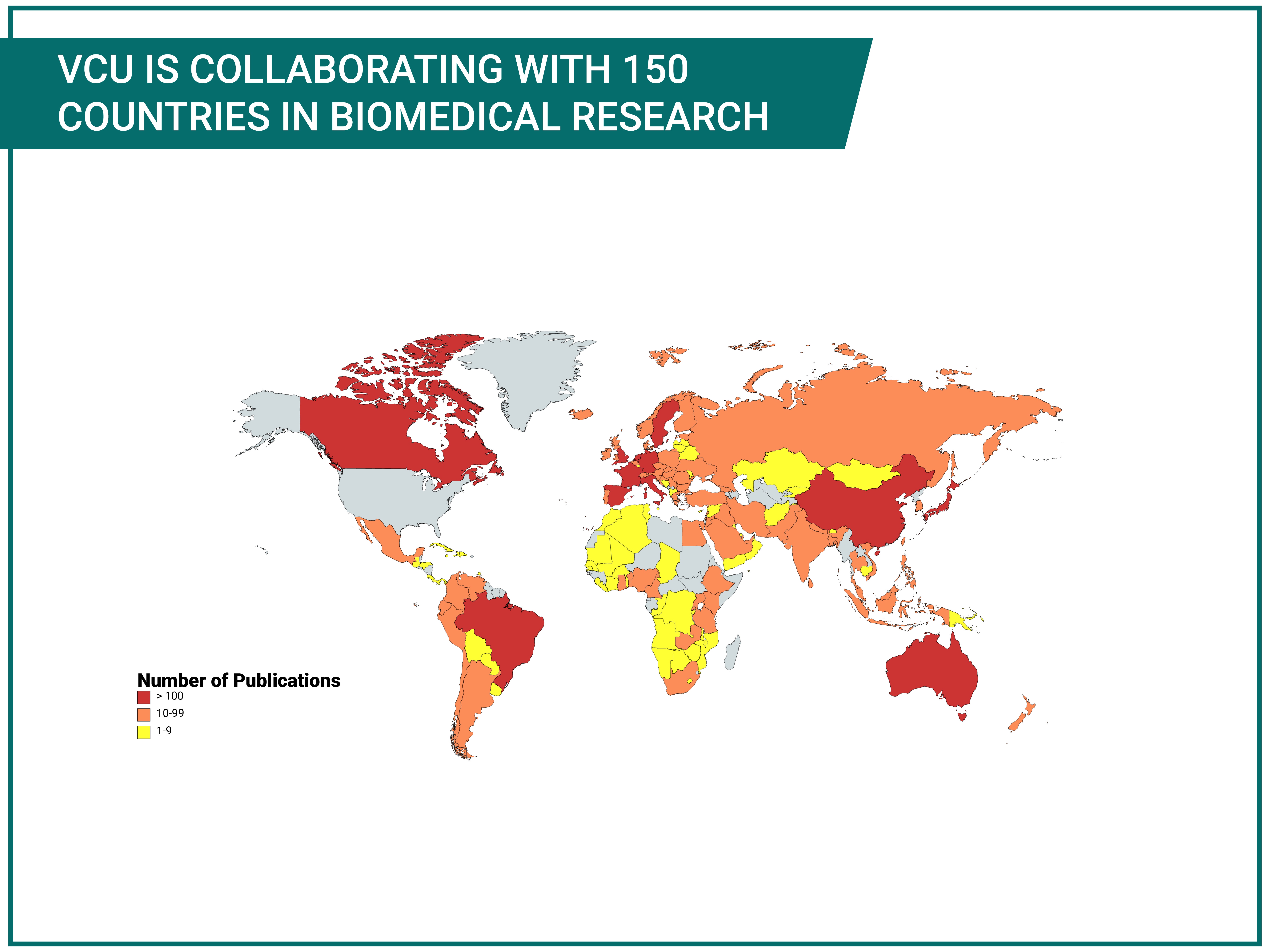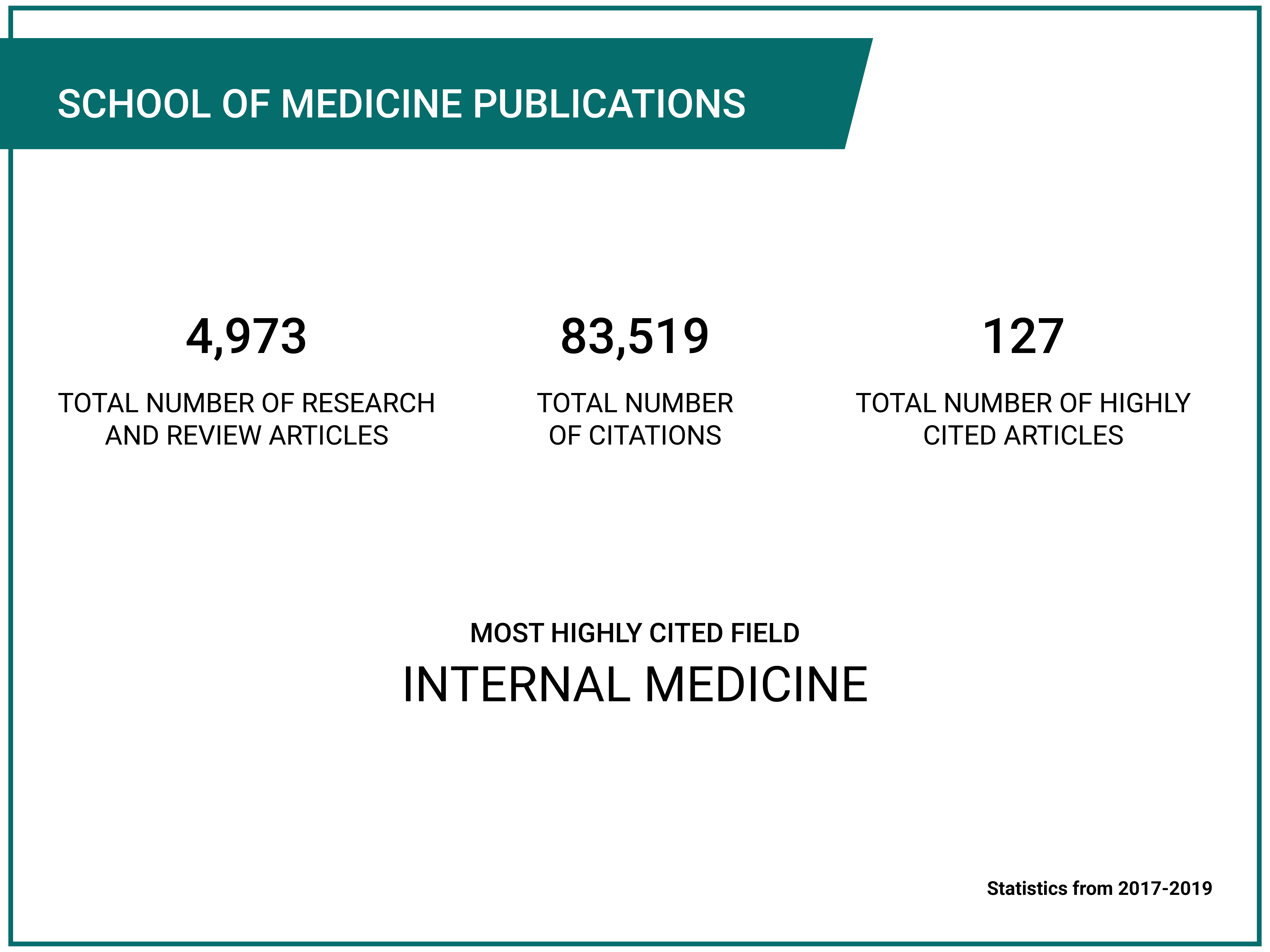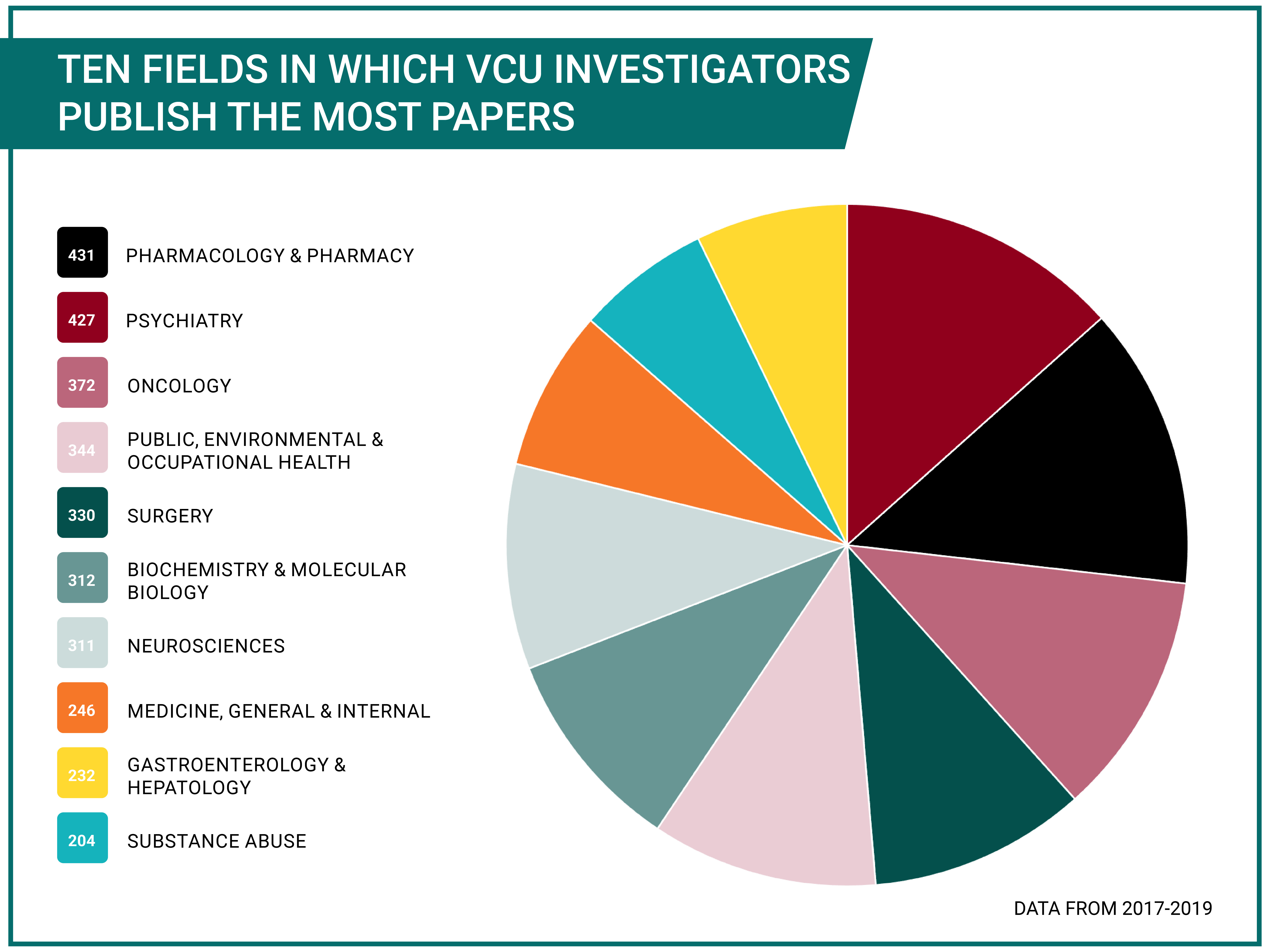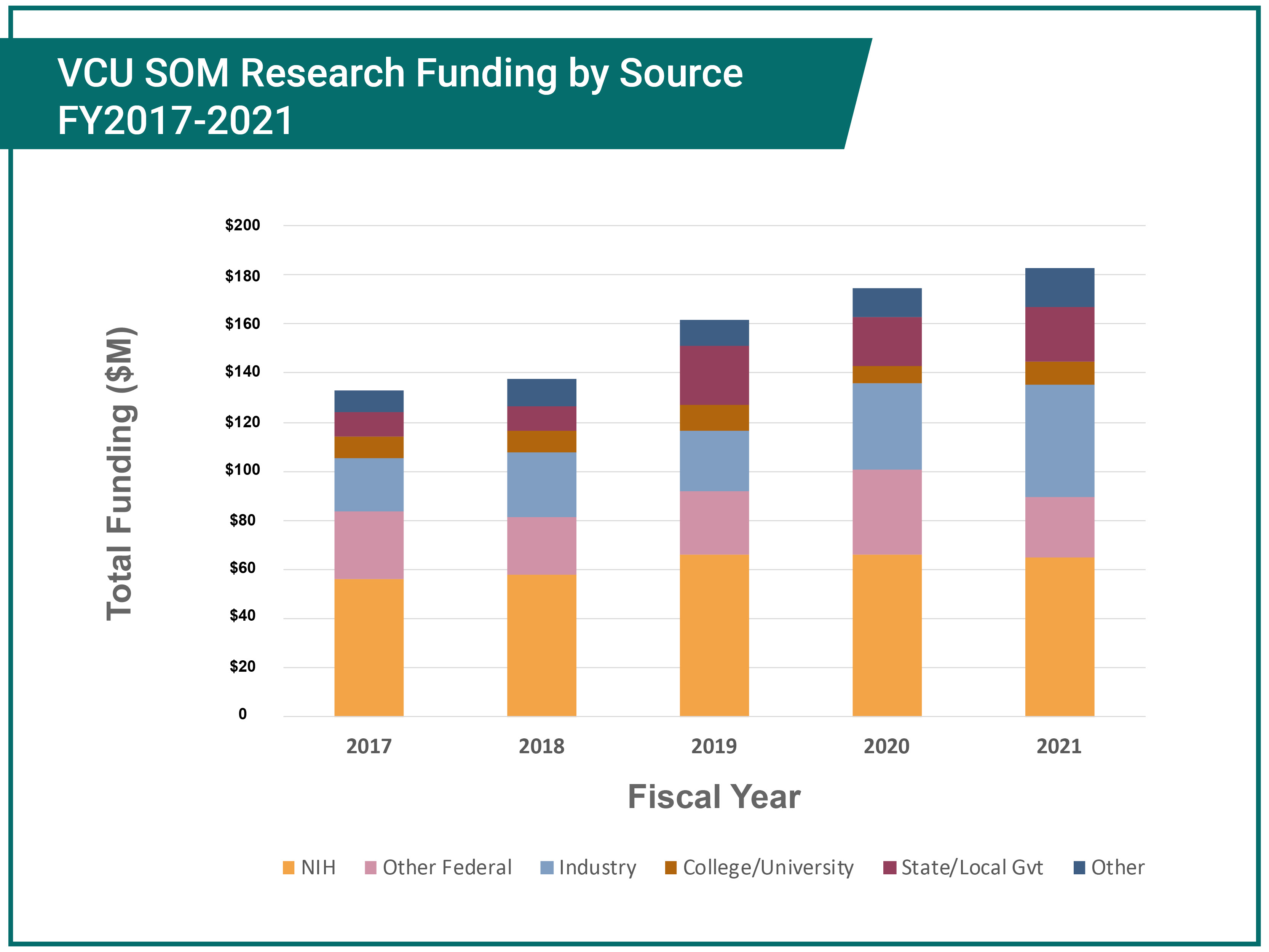Reimagining Basic Health Sciences Steering Committee Report
Convened at the request of Dean Saavedra, the Reimagining Basic Health Sciences Steering Committee was tasked with evaluating the current state of the School of Medicine's basic health sciences department, and recommending a plan to strengthen existing departments as well as a framework to align basic/translational science with VCU Health research areas.
Research at a Glance
Dean’s Biomedical Research Seminar Series
The Dean's Biomedical Research Seminar series was established to attract highly-accomplished investigators to VCU to present their recent research findings and connect with SOM researchers. Seminar speakers must be recognized for substantial advances in biomedical science with work that is of broad interest to the VCU SOM faculty and trainees. Potential speakers may be nominated by any member of the VCU community. The Dean’s office covers the cost of their visit, while the nominating departments/hosts are responsible for making logistical arrangements to facilitate the visit. Speakers are expected to meet with faculty, postdoctoral trainees and graduate students from various departments.
Funding Opportunities for Faculty Members
VCU offers multiple funding opportunities from internal resources to support investigators in their research activities. The primary purpose of these grants is to help investigators generate preliminary data for competitive applications to external funding agencies. These short-term funding opportunities have different requirements and funding cycles. Internal funding programs are sponsored by different units, such as individual departments, schools, research centers, institutes, and VCU. Each week, the Office of Research at the School of Medicine sends an email via a listserv to researchers in the SOM in which various funding opportunities and other notices are listed, with details provided in an attachment.
Please Click Here and provide the requested information if you would like to be added to the listserv
The accordions below provide additional information and links to ongoing or periodic internal funding opportunities available to the faculty members of the School of Medicine. The Office of the Vice President for Research and Innovation has additional opportunities listed on its website, which can be viewed at this link.
Purpose
In a continued effort to enhance our research mission and support faculty, the School of Medicine (SOM) is pleased to provide bridge funding for successful investigators experiencing a lapse in NIH or other federal support. Bridge funding is temporary and specifically intended to provide investigators with the resources needed to respond to critiques of applications that were favorably reviewed but not funded. Competitive bridge applications should provide a specific point-by-point plan to address reviewer critiques and explain how this would be facilitated by bridge funds.
Aligned with the SOM's goal of fostering the success of early-career scientists—and in addition to robust onboarding and mentorship programs—bridge funding may also support early-stage investigators who have received favorable scores on their first major grant (R01 or equivalent) but need to generate additional data to address reviewer concerns and strengthen their application.
Eligibility
Bridge funding applications will be accepted from investigators who meet one of the following criteria:
- The applicant is a full-time member of the SOM faculty.
- The applicant is the principal investigator of an NIH R01, P01/U19, or similar award that has ended or is about to end, and has submitted a new or renewal application that was reviewed favorably but not funded;
OR - The applicant is the principal investigator of an R21, K23, K08, K01, or similar award that has ended or will end in 30 days or less and, based on data from the prior award, has applied for an R01, P01/U19, or similar award from the NIH that was reviewed favorably but not funded.
- The applicant provides a plan to submit a more competitive application within one year of receiving bridge funding.
- The applicant has demonstrated continued productivity through peer-reviewed publications.
OR
- The applicant is an early-stage investigator (as defined by NIH) and a SOM faculty member actively seeking their first federal grant (R01 or equivalent). The applicant must have received favorable scores on the submission and requires additional data to respond to reviewer comments. Applicants must qualify as early-stage investigators per NIH criteria. For more information, visit the NIH Early-Stage Investigator Policy.
Note: Requests for student support should be directed to the investigator’s department or graduate program. Student support may be considered if such support is not available through other sources, but the request must be clearly articulated and justified.
Additional Notes:
- Multi-Principal Investigators on large grants (e.g., P01, P30, P50 or similar) who have distinct projects and budgets and are experiencing funding delays due to administrative reasons beyond their control may request support through a separate mechanism. Please contact SOM research leadership for further guidance.
- Please review the complete funding and application requirements before submitting your request for bridge funding.
Award Terms
- Budgets up to $80,000 will be considered. Justification and details must be provided. In special cases, larger budgets may be reviewed.
- Funding is provided for up to one year. The award start date will be specified in the award letter. Investigators may request a change in the start date.
- Award funds may be used for services, animals, supplies, and salaries for key research personnel. Indirect costs are not allowed. PI salary and effort must be covered by the department.
- Travel is not allowed except under special circumstances and requires justification provided by the PI.
- Departments are expected to contribute 20% of the total cost when possible.
- If external funding is secured before the bridge funding period ends, unexpended funds must be returned to the School of Medicine.
- Awardees must submit a report one year after the start date, detailing how the funds were used and outlining plans for securing external funding.
- Please acknowledge Bridge funding in publications resulting from Bridge funding support.
Application Requirements
Applications must be submitted online using the link provided below and must include the following:
- Letter of endorsement from the department chair confirming:
- The applicant’s salary and research time will be protected.
- Any departmental contributions (e.g., support for personnel, animals, or supplies).
- Letter from the Principal Investigator (PI) that includes:
- Current research and funding status (2-page limit).
- Future funding plans (1-page limit).
- A clear experimental plan to address reviewer comments for a more competitive resubmission. Please also provide a specific point-by-point plan to plan to address the reviewers critiques and explain how this would be facilitated the bridge funds.
- If modest productivity was noted in the review, the application should include a plan to address it.
- Budget:
- Requested amount and how funds will be used (1-page limit).
- Justification explaining how the funds will help secure external support (1-page limit).
- Departmental cost-share justification (if applicable): If the department cannot provide the 20% cost share, a clear explanation from the Chair must be included.
- Complete CV (including information about current and pending funding).
- Copy of current or most recent grant application(s).
- Reviewer critiques for the most recently reviewed submission(s).
- Any relevant correspondence regarding the grant application.
Application Submission
Submit your application at:
🔗 Bridge Funding Application Link
https://redcap.vcu.edu/surveys/?s=DXATKKED9YJLNDXP
Questions?
Contact:
Dr. Zakir Ullah
Director, Scientific Review, School of Medicine
📧 zakir.ullah@vcuhealth.org
Review and Funding Decision
Applications will be reviewed by a standing faculty committee chaired by Dr. Laura SimSelley, Professor in the Department of Pharmacology and Toxicology. The committee will make recommendations to the Senior Associate Dean for Research, who will consult with the Dean of the School of Medicine. Final funding decisions will be made by the Dean.
VCU Quest Fund Supports new, emerging or continuing research in any discipline or area of research focus, particularly work that advances transdisciplinary research, multidisciplinary research, cross-campus collaboration and research with a high potential for translation to practice or market. The VCU Quest fund aims to afford all faculty an internal funding opportunity to support new, emerging or continuing research. Proposed research should align with the goals and key strategies presented in VCU’s strategic plan. Funded proposals require matching funds from the unit (school or college). Applications by faculty members whose primary appointment is in the School of Medicine are reviewed and ranked by the SOM while final funding decisions are made by an executive committee with representatives from all the schools. Multi-investigator awards spanning more than one unit are encouraged.
The Wright Center for Clinical and Translational Research (CCTR) supports meritorious clinical and translational health sciences research. The goal of the funding mechanisms is to allow researchers to collect data that will support external funding for work that ultimately improves patient and community health outcomes.
Internal funding opportunities include the following:
- Endowment Fund grants,
- Career Development Awards,
- Pilot Imaging Fund
- Clinical Research Voucher Program
The Wright Center also provides resources and training opportunities for faculty members who are applying for research funding and helps faculty members with identifying additional internal and external funding mechanisms.
Competitive funding opportunities to support VCU Massey Comprehensive Cancer Center (MCCC) scientific members is available through both intramural and extramural sources. MCCC produces a monthly funding newsletter, which highlights the details of upcoming funding opportunities.
Intramural funding opportunities include the following:
The Children’s Health Research Institute at the Children’s Hospital of Richmond at VCU [pdf] started a grant program in March 2021 aiming to foster collaborations on research relevant to the health and development of children. At least six grants of up to $50,000 each will be available each year.
The program aims to fund projects that include investigators from more than one unit (division, department, school) at VCU that will produce data likely to support a competitive external grant submission.
At least one of the PIs must be a member of the CHRI. CHRI membership is open to anyone affiliated to VCU and VCUHS.
Applications for the year 2021.
Announcement: March 18, 2021
Submission deadline: May 21, 2021
Award start date: Aug. 1, 2021.
For eligibility criteria and more information please contact:.
Henry J. Rozycki
Some of the academic departments at the SOM, such as the Departments of Surgery and Internal Medicine, provide financial support to faculty members to promote scientific research.
For more information, please contact:
Department of Surgery
Amanda Jabri
orbit@vcuhealth.org
Department of Internal Medicine
Fadi Salloum, Ph.D.
fadi.solloum@vcuhealth.org
For other SOM departments, please contact the department chair to find out more about funding opportunities and the proposal submission process.
Higher Education Equipment Trust Fund (HEETF)
The Higher Education Equipment Trust Fund (HEETF) of Virginia provides funding to institutions of higher learning including Virginia Commonwealth University to upgrade equipment needed for instruction and research. VCU's process to determine the allocation of HEETF funds is designed to direct resources to meet overarching institutional needs as articulated in the VCU Strategic Plan. A VCU committee coordinate requests for these funds, thereby assuring non-duplication of expenditures and careful planning for the maximum benefit to the University.
Each school or unit prioritize the requests submitted to VCU for final consideration. The School of Medicine has set up a committee to evaluate and prioritize HEETF funding requests by its faculty members. Faculty members are encouraged to start the process early and talk to other colleagues about the need for equipment that can be supported by HEETF funding. While HEETF is mainly used for expensive equipment that can benefit multiple investigators and core facilities, smaller equipment, that can be used by multiple investigators, will also be considered for HEETF funding. The equipment can be requested for both clinical and basic science research and education.
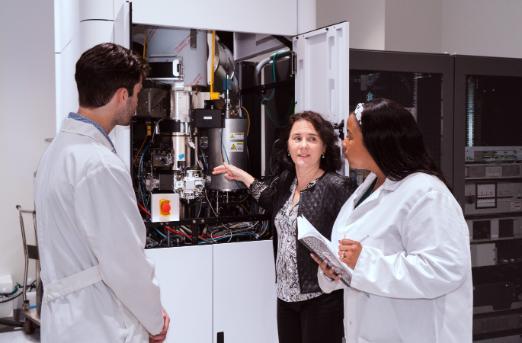 Examples of equipment purchased by the SOM through HEETF funding.
Examples of equipment purchased by the SOM through HEETF funding.
- Cryo-electron microscope
- Binary Gradient HPLC Systems
- Leica DMi8 S Microscope
- Thundra Cryo-Transmission Electron Microscope
Proposal submission deadlines
Proposals are accepted for funding in the Spring of each year. Submission deadlines vary and are shared with faculty members when finalized. Please consult Dr. Fadi Salloum (fadi.salloum@vcuhealth.org) or Dr. Zakir Ullah (zakir.ullah@vcuhealth.org) for more information and submission deadlines.
Instructions for Preparing HEETF Proposals
HEETF Funding Announcement
Click on the link below to download HEETF funding announcement.
SOM Announcement_Higher Education Equipment Equipment Trust Fund 2025
VCU Office of Research and Innovation has added to its website a list of all internal funding opportunities at VCU.
Click here to access the list
Or visit the VCU Office of Research and Innovation website and look under Resources
Research Facilities and Resources
Research resources available to VCU SOM faculty include administrative, academic and outreach support services, along with formal partnering opportunities with nearby institutes, research cores and established theme-focused research institutes and centers.
VCU SOM has established partnerships with several area academic and industrial institutes to promote collaborative science. Research core services supported by the VCU SOM span a broad range of disciplines and include fee for service partnerships with other Virginia universities and colleges. The research infrastructure supported by the SOM includes 11 locations across both the SOM and Monroe Park campus. Institutes and centers have been established at the SOM which support a wide range of disease focused research.
VCU School of Medicine has a variety of administrative, communication, outreach, and research support resources available to its faculty.
- SOM Research Administration
- Office of Assessment, Evaluation and Scholarship
- News
- VCU Libraries
- Human research
- Animal research
- Regulatory committees
- VCU supply centers
- CITI Training: Collaborative Institutional Training Initiative
- BioRAFT Research Management Platform for Training in Safe Research Practices
- Istitutional Review Board (IRB) Submission Through RAMS-IRB
VCU has entered into a reciprocal resource-sharing agreement with other institutions, which provide access to research expertise and cores services to all VCU faculty.
VCU has a large number of core laboratories to support research. Core laboratories receive financial support from different sources including the SOM. However, all are available to all VCU researchers, typically on a fee-for-service basis. Access to SOM-supported core laboratories is also possible, on a more limited basis, for outside academic and commercial users.
- Cancer Mouse Models Core Laboratory
- Chemical and Proteomic Mass Spectrometry Core Laboratory
- Flow Cytometry Core Laboratory
- VCU Genomics Core Laboratory
- Lipidomics and Metabolomics Core Laboratory
- Microscopy Core Laboratory
- Tissue and Data Acquisition and Analysis Core (TDAAC)
- Transgenic/Knockout Mouse Core Laboratory
- Biostatistics
- Cancer Informatics Core
- Other VCU cores
VCU has agreements with other Virginia research universities and institutes who provide core services. A full list of participating universities and institutes and service provided is available here.
Recent additions to research space include the Goodwin Research Building (opened in 2005 to support research in the Massey Cancer Center), the Molecular Medicine Research Building (opened in 2009), the Pauley Heart Center (on the seventh floor of Sanger Hall, completed in fall 2012), the Massey Cancer Center vivarium (completed in fall 2012, renovated in 2020) and the expansion of space for our Structural Biology Core in the basement of the James W. and Frances G. McGlothlin Medical Education Center (completed in fall 2013).
All new labs are organized in an open lab format to encourage research collaboration. The receipt of an NIH Clinical and Translational Science Award in 2010 led to the creation of the Center for Clinical and Translational Research (CCTR), located in the old Richmond Academy of Medicine Building. The increased space for basic science research and creation of the CCTR has enabled us to move more easily toward the translation of basic science discoveries into new and novel treatments for patients. For more details on each research space, click on the links in the list below:
- BioTech 1 and Center
- One Capital Square
- Sanger Hall
- Kontos Medical Science Building
- Molecular Medicine Research Building
- VCU Health Sciences Research Annex
- Goodwin Research Laboratory
- McGlothlin Medical Education Center
- Clinical Research Unit
- West Hospital
Virginia Commonwealth University’s Centers and Institutes (ICs) work across disciplines and research to create new knowledge. Representing some of the most cutting-edge investigations taking place in the world today, the VCU’s ICs conduct unique investigative collaborations to add value to the university in terms of intellectual power, resources and collaborative potential, transitioning basic science to clinical trials, extramural funding and resource development.
- Wright Center for Clinical and Translational Research (CCTR)
- Massey Cancer Center (MCC)
- Center on Society and Health
- Institute for Drug and Alcohol Studies (IDAS)
- VCU Center for Rehabilitation Sciences and Engineering (CERSE)
- Parkinson’s and Movement Disorders Center
- Pauley Heart Center
- Center on Health Advancement
- VCU Center on Society and Health
- Institute for Women's Health
- Translational Research Initiative for Pain and Neuropathy at VCU (TRIPN)
The equitable distribution of laboratory space is critical to the School of Medicine research mission. No department, institute or center, member of the faculty, or staff has permanent rights to laboratory space. The Dean of the School of Medicine or his/her designee assigns all space based on the principles described in the Guidelines for SOM Research Space Assignments. Faculty members may expect to have laboratory space adjustments, gaining or relinquishing space over time as productivity and priorities change.
Please click on the following link to access SOM's policy for Research Space Assignments.
Research Opportunities for Trainees
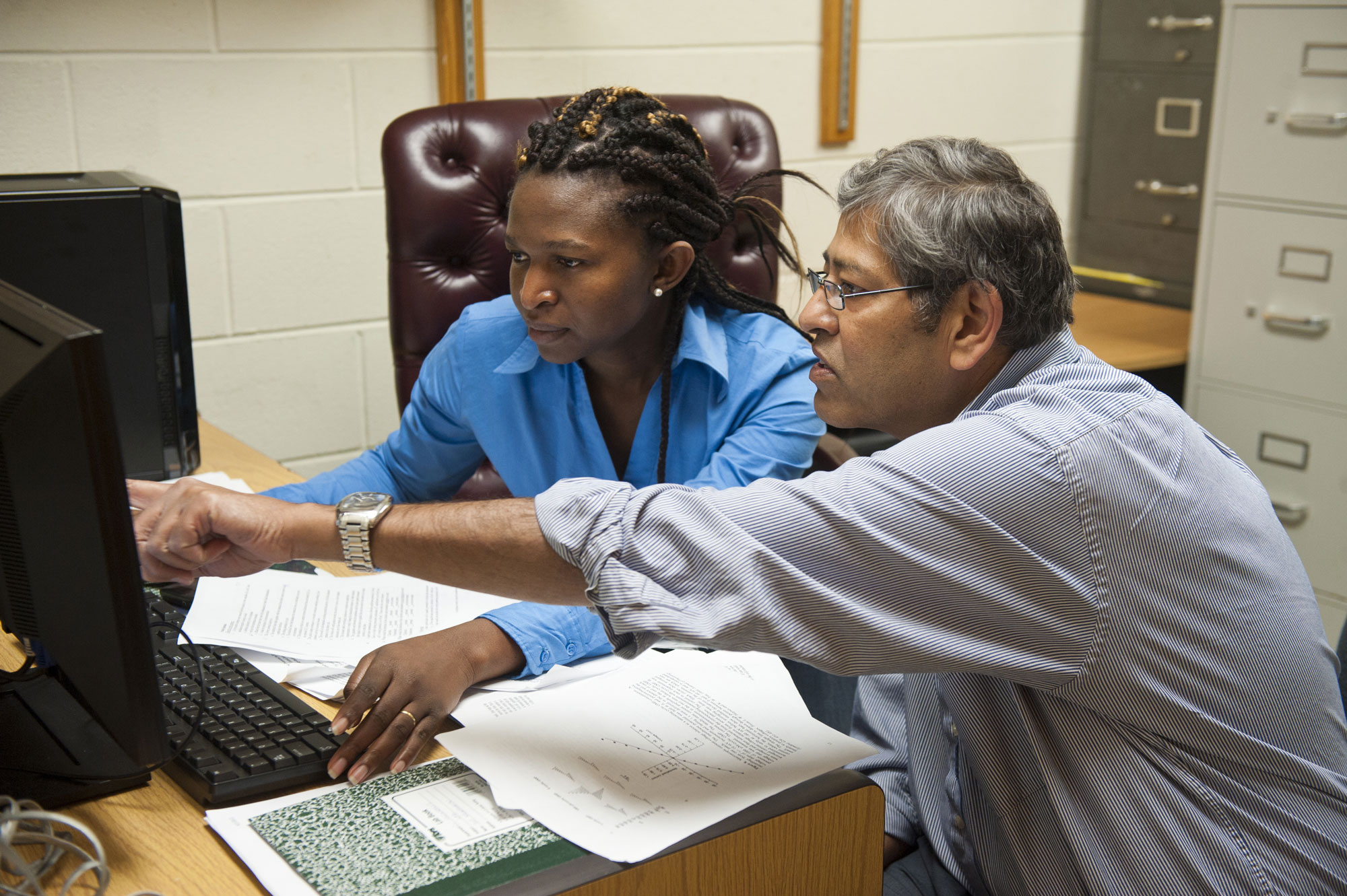 VCU offers a wide variety of research opportunities to all levels of trainees. Whether you are an undergraduate student ready to test scientific waters, a graduate student seeking training for a career in biomedical sciences, or making plans for a postdoctoral fellowship, VCU School of Medicine has a wealth of research opportunities to meet your needs. We welcome you to use this site to search for potential mentors.
VCU offers a wide variety of research opportunities to all levels of trainees. Whether you are an undergraduate student ready to test scientific waters, a graduate student seeking training for a career in biomedical sciences, or making plans for a postdoctoral fellowship, VCU School of Medicine has a wealth of research opportunities to meet your needs. We welcome you to use this site to search for potential mentors.
Please review the accordions below for more resources and information, including a variety of fellowships and training grants tailored to every level of trainee.
The VCU School of Medicine hosts a vibrant community of postdoctoral scholars and provides a broad spectrum of postdoctoral positions and fellowships.
Resources
- VCU jobs site: search keyword “postdoctoral”
- Postdoctoral services
- How-to Talks by Postdocs: a series of instructional brown-bag lunch talks for the general VCU health sciences community presented by postdocs.
Programs
- NIDDK Integrated Virginia Research Training Centers in Kidney, Urology and Hematology (IGNITE KUH): This program provides tuition, stipend and travel support for first- and-second year Ph.D. students and postdoctoral fellows. We are developing a collaborative and integrated partnership involving the three major research training centers in the Commonwealth of Virginia, UVA, VCU and Virginia Tech, and are committed to developing the next generation of diverse KUH researchers. More information is available here.
- VCU Institutional Research and Academic Career Development Award (VCU IRACDA): Three-year program designed to train fellows in biomedical research and teaching to motivate the next generations of scientists at minority-serving institutions
- Cancer Prevention and Control Fellowship
- Pauley Heart Center Cardiology Training Grant: The NHLBI-sponsored T32 Multi-Disciplinary Training Program in Translational Cardiovascular Research, with an emphasis on training both M.D. and Ph.D. investigators, is intended to augment the supply of physicians and scientists capable of developing new advances in multi- disciplinary translational cardiovascular research directed toward the treatment and prevention of cardiovascular disease. For more information on how to apply, email Megan O’Hare at megan.ohare@vcuhealth.org
The VCU School of Medicine offers a number of programs for those interested in doctoral, master's, and postbaccalaureate studies. More information about the programs can be found at the graduate school website.
Doctoral Programs
There are 11 individual Ph.D programs offered at the VCU School of Medicine.
VCU Initiative for Maximizing Student Development
The VCU Initiative for Maximizing Student Development (VCU IMSD) Graduate Program provides Ph.D. level training in the biomedical sciences for individuals from groups traditionally underrepresented in biomedical research. Click here to find out more about the IMSD PhD programs at the VCU School of Medicine
IGNITE KUH
Ph.D. students are also eligible for the NIDDK Integrated Virginia Research Training Centers in Kidney, Urology and Hematology (IGNITE KUH) program, a collaborative partnership between VCU, UVA and Virginia Tech. Learn more about the IGNITE KUH program.
Master's Programs
There are 11 individual Master's programs offered at the VCU School of Medicine.
Click here to find out more about Master’s Degree programs at the VCU School of Medicine.
Postbaccalaureate Programs
The VCU Postbaccalaureate Research Education Program (VCU PREP) is a one-year biomedical research training program for recent college graduates in groups that are underrepresented in the biomedical sciences.
Click here to find out more about the VCU Postbaccalaureate Research Education program
The Premedical Graduate Certificate Program (CERT) is a one-year, graduate-level program for individuals seeking to enhance their qualifications for admission into professional school, including Medical and Dental School. Many CERT students obtain accelerated Masters degrees after completing the program while applying to professional school.
Click here to find out more about the Premedical Graduate Certificate program.
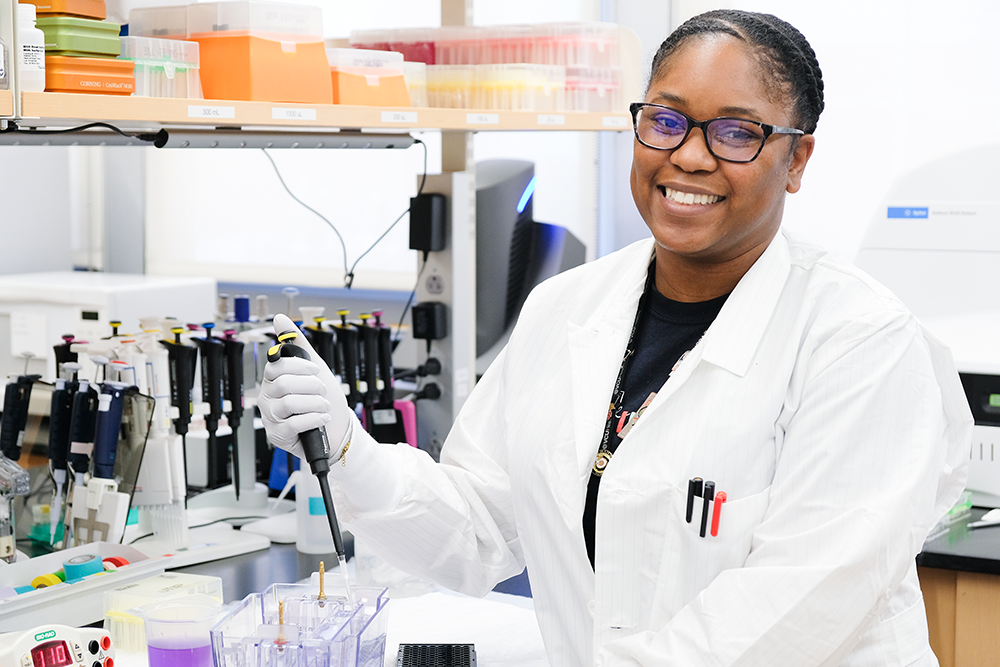 Our faculty engage in basic science, translational and clinical studies across dozens of specialties and subspecialties within academic medicine, and we encourage students to take advantage of these diverse research opportunities.
Our faculty engage in basic science, translational and clinical studies across dozens of specialties and subspecialties within academic medicine, and we encourage students to take advantage of these diverse research opportunities.
VCU provides a breadth of resources, programs and fellowships for VCU undergraduate students to get involved in research at the VCU SOM.
Resources
- VCU Office of the Provost
- VCU Science Hub
- VCU Student Opportunity Center
- VCU Bioadvising
- The Path to Becoming an Undergraduate Researcher
Programs and Fellowships
The Research Student Interest Group (RSIG) at the VCU School of Medicine is a student-run interest group with the goal of promoting a community where students can learn about, explore and get involved in research. Information regarding upcoming events, workshops, and research fellowship opportunities can be found on its website.
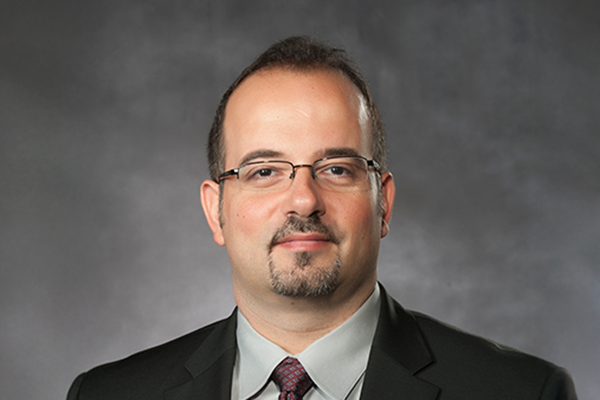
Fadi N. Salloum, Ph.D.
Senior Associate Dean for Research

Fadi N. Salloum, Ph.D.
Senior Associate Dean for Research
Office of Research and Research Training
Email: fadi.salloum@vcuhealth.org
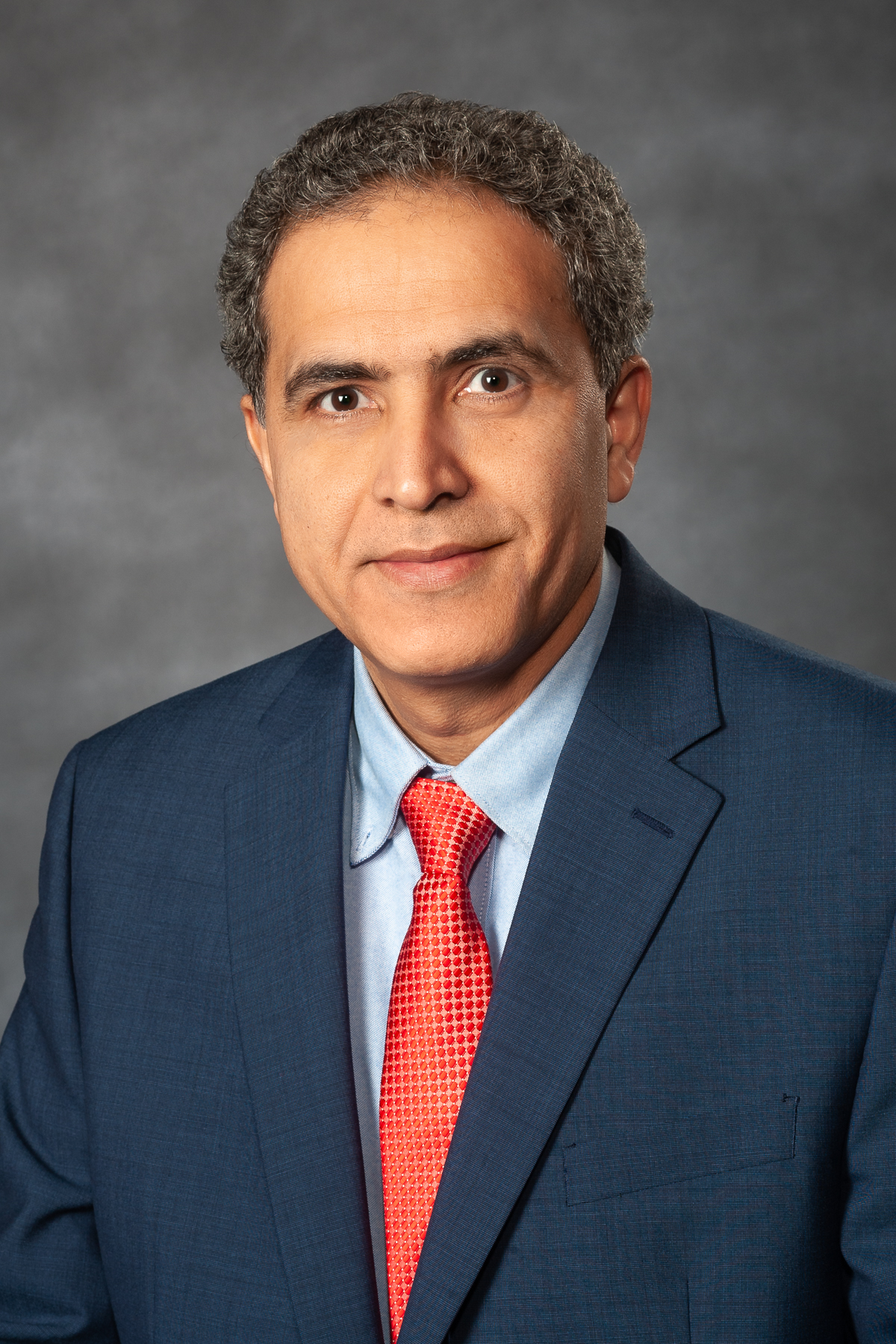
Zakir Ullah, PhD
Director Scientific Review

Zakir Ullah, PhD
Director Scientific Review
Office of Research and Research Training
Phone: (804) 828-0272
Email: Zakir.Ullah@vcuhealth.org
Address/Location:
Physical: 1101 E Marshall St, Sanger Hall, Room 1-055
